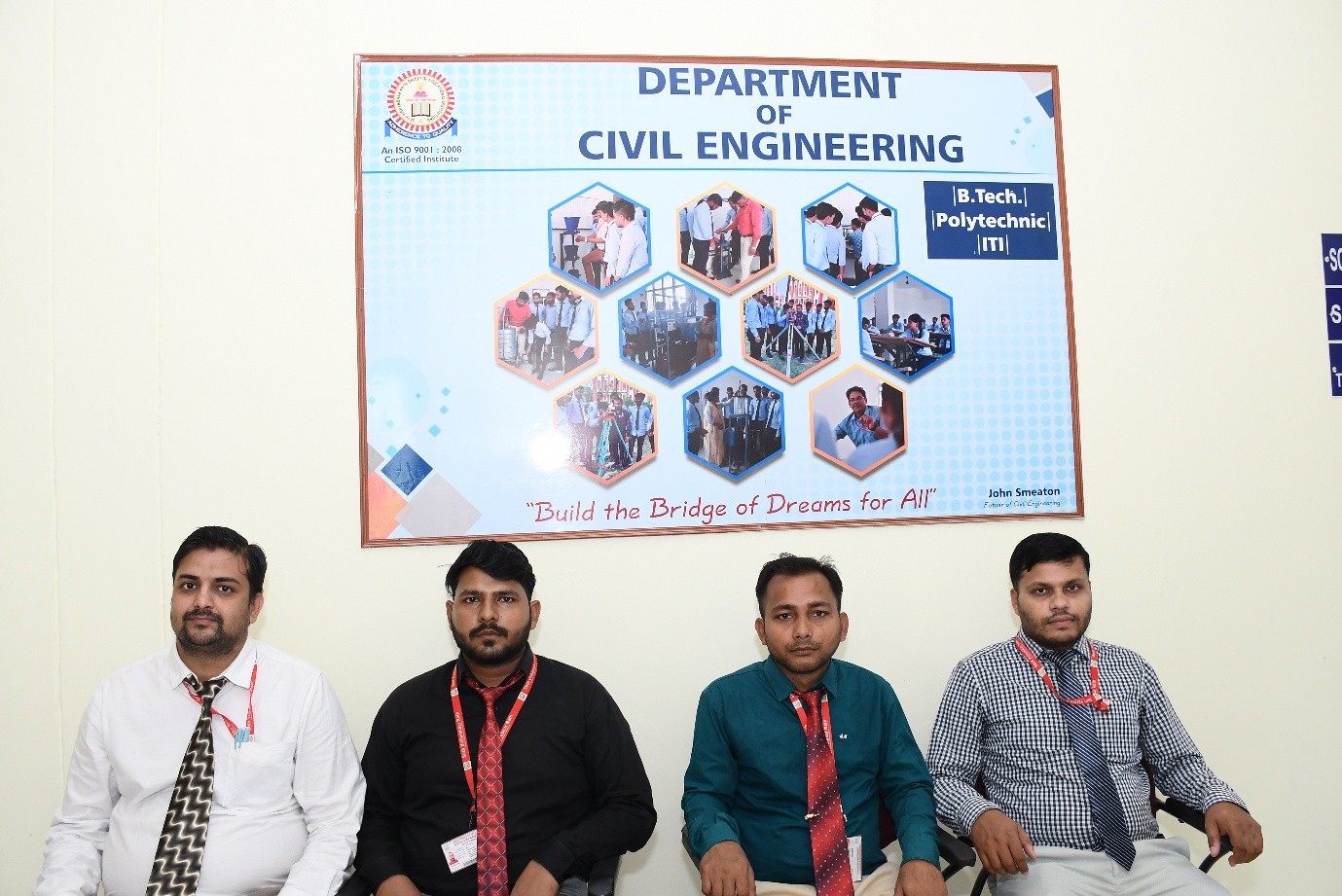
The Department of Civil Engineering
The department of Civil Engineering was established in the year 2010. We work in improving the professional & Practical knowledge of the students to full fill the need of an ever-changing world. The department aims to provide a strong foundation for the holistic development and growth of the students by enriching them with technical skills. We acknowledge student by providing them awareness regarding mini projects and industrial training for their encroachment in Civil engineering field. We also plan to develop entrepreneurial skills in students through summer internships so that they would drive the spirit of growth of our economy and would be able to generate employment opportunities for other qualified and skilled people.
Newsletter
Achievements
Departmental Society
Institute–Industry Interaction
Vision of the Department:
To produce technically skilled global perspectives with various energy resources and environments of the highest caliber in the emerging field of Civil Engineering and make them ready for society's needs.
Mission of the Department:
M-1: To achieve academic excellence in Civil Engineering through high-quality practices.
M-2: To provide a promising environment for numerous career opportunities.
M-3: To work on live projects based on current industrial needs.
M-4: To pursue the economic growth of a nation.
M-5: To ensure the continuous improvement in the quality of life of people in society.
Program Educational Objectives
(PEOs)
PEO-1: Graduates will be able to enhance their skills through training, professional practices, the pursuit of higher education, and research.
PEO-2: Graduates will be able to apply the basic concept of applied science, mathematics, and management skill for a sound foundation essentially to analyze and design civil infrastructure systems.
PEO-3: Graduates will be able for writing and oral effective communication and other multi-disciplinary approaches for a better career in the field of civil engineering.
PEO-4: To able students for advanced developed technical skills and studies, for good teamwork as well as leadership roles in their profession.
PEO-5: To offer educational programs that impart inventive knowledge with high levels of ethical and human values.
Program Outcomes (POs)
(Engineering Graduates will be able to)
PO-1 Engineering Knowledge: Apply the knowledge of mathematics, science, engineering fundamentals, and an engineering specialization to the solution of complex engineering problems.
PO-2 Problem analysis: Identify, formulate, review research literature, and analyze complex engineering problems reaching substantiated conclusions using first principles of mathematics, natural sciences, and engineering sciences.
PO-3 Design/development of solutions: Design solutions for complex engineering problems and design system components or processes that meet the specified needs with appropriate consideration for the public health and safety, and the cultural, societal, and environmental considerations.
PO-4 Conduct investigations of complex problems: Use research-based knowledge and research methods including design of experiments, analysis and interpretation of data and synthesis of the information to provide valid conclusions.
PO-5 Modern tool usage: Create, select, and apply appropriate techniques, resources, and modern engineering and IT tools including prediction and modeling to complex engineering activities with an understanding of the limitations.
PO-6 The engineer and society: Apply reasoning informed by the contextual knowledge to assess societal, health, safety, legal and cultural issues and the consequent responsibilities relevant to the professional engineering practice.
PO-7 Environment and sustainability: Understand the impact of the professional engineering solutions in societal and environmental contexts, and demonstrate the knowledge of, and need for sustainable development.
PO-8 Ethics: Apply ethical principles and commit to professional ethics and responsibilities and norms of the engineering practice.
PO-9 Individual and team work: Function effectively as an individual, and as a member or leader in diverse teams, and in multidisciplinary settings.
PO-10 Communication: Communicate effectively on complex engineering activities with the engineering community and with society at large, such as, being able to comprehend and write effective reports and design documentation, make effective presentations, and give and receive clear instructions.
PO-11 Project management and finance: Demonstrate knowledge and understanding of the engineering and management principles and apply these to one’s own work, as a member and leader in a team, to manage projects and in multidisciplinary environments.
PO-12. Life-long learning: Recognize the need for and have the preparation and ability to engage in independent and life-long learning in the broadest context of technological change.
Program-Specific Outcomes (PSOs)
After the successful completion of B. Tech. program in “Civil Engineering” the graduate will have
PSO-1: To impart theoretical and practical knowledge to the students for designing, and providing the solutions for the societal problem.
PSO-2: To impart stability to the students for enhancing their employability skills by making them capable of qualifying National level competitive examinations.
PSO-3: To impart knowledge about analysis and design of building analysis software packages.
Message from HoD’s Desk

Mr. Chandra Kumar
(Assistant Professor)
Area of Interest: Structural Analysis, Surveying and Geomatics, Environmental Engineering, Railway, Waterway and Airway Engineering.
The department of Civil Engineering offers the program of Bachelor of Technology (B.Tech.) in “Civil Engineering” a 4-year undergraduate program since 2008.
As Head of the Department, I feel privileged to lead a talented and dynamic group of faculty and dedicated staff members.
During the program, we build students in a way that they are able to cast their career, enrich their technical, practical skills and also inculcate them with better communication. We provide upgraded education facilities keeping in mind the growing technology regarding smart city and the futuristic development which is required according to the demand of the society. We encourage our students for higher education to appear for the National Level Exam and if required we arrange for remedial classes.
The department has very well qualified faculty, well developed and equipped laboratories. We have a strong hold on an undergraduate program for evolving a Civil engineer for the innovative generation to handle the imminent challenges of the society. This department maintains strong relationships with industry and the community at large.
With Best Wishes
Department of Civil Engineering.
Civil Engineering Faculties

Mr. Qamar Ahamad
(Assistant Professor)
Area of Interest: Structural Analysis, Design of Concrete Structures, Design of Steel Structures, Fluid Mechanics, Hydraulic Engineering and Machines, Concrete Technology.

Vinod Sonkar
(Assistant Professor)
Area of Interest: Structural Analysis, R.C.C , Steel Structure, Soil Mechanics, Surveying, Concrete Technology.

Sanjeev Kumar Pal
(Assistant Professor)
Area of Interest: Soil Mechanics, Surveying, Structural Analysis, Transportation Engineering.

Bageshwar Mishra
(Assistant Professor)
Area of Interest: Environmental Engineering, Water & Wastewater Treatment, Solid Waste Management, Environmental Impact Assessment.

Mr. Vipin Kumar Maurya
(Assistant Professor)
Area of Interest: Hydraulics and Hydraulic Machines, Surveying, Water and Waste water Engineering, Irrigation Engineering, RCC Structures, Materials, Testing & Construction Practices.

Mr. Chandra Kumar
(Assistant Professor)
Area of Interest: Structural Analysis, Surveying and Geomatics, Environmental Engineering, Railway, Waterway and Airway Engineering.

Mr. Aman Saini
(Assistant Professor)
Area of Interest: Structural Analysis, Concrete Technology, Repair and Maintenance of Buildings, Geotechnical Engineering, Design of Steel Structure.

Miss. Saumya Yadav
(Assistant Professor)
Area of Interest: Highway Engineering, Drawing, Surveying, Quantity Estimation and Construction Management, Earthquake Engineering.
Syllabus
Newsletter
Achievements
Departmental Society
Institute–Industry Interaction
Laboratories
The civil engineering laboratory is used for performing experiments for the structures, materials science, soils, hydrology, environmental science, mechanics, project management, and other fields.. The students are able to Identify and list various building materials, their properties and symbols. It helps students to understand as prospective engineers how to spend time visiting project sites, meeting with stakeholders, and preparing construction plans.
This provides students with an academic environment which makes them aware about excellence in field of Civil Engineering and enables them to recognize significance of lifelong learning on global perspective. It builds an academic environment for students that make them aware of excellence in field of Civil Engineering
Surveying and Geomatics Lab
Surveying and Geomatics lab involves the practices which have an accurate assessment, measuring, and plotting of land & water boundaries for development projects that include buildings, roads, and bridges. This determines the relative position of any objects or points of earth. It helps students to understand the distance and angle between different objects.
The main aim of Surveying and Geomatics lab is to gather field data so a map or a plan can be organized based on the calculations of the field parameters before an engineering act is actually performed to begin construction project.

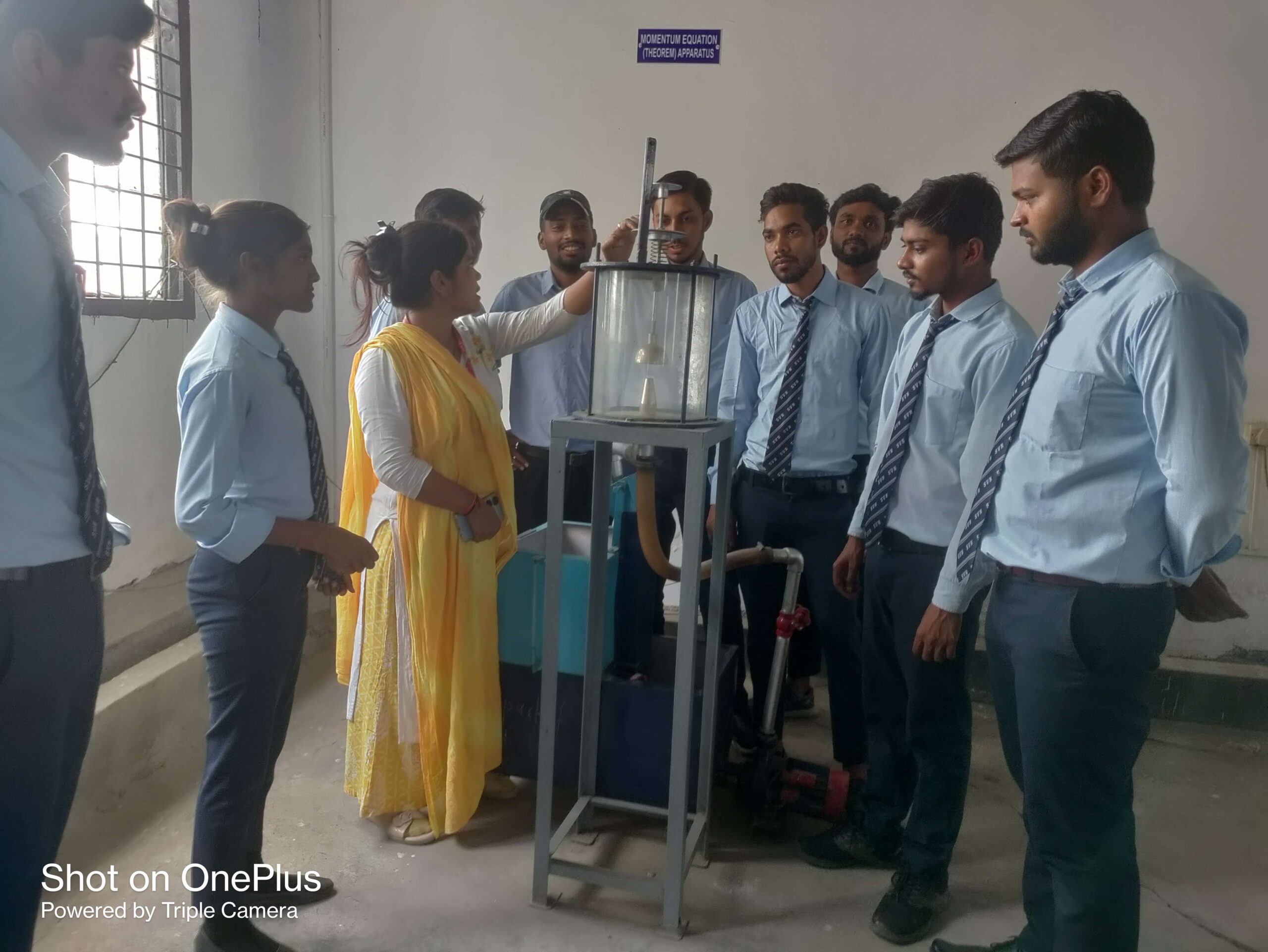
Fluid Mechanics Lab
The Fluid Mechanics laboratory is designed to inspect the properties of fluids and to perform the experiments connecting both incompressible and compressible flow.
For a civil engineer fluid mechanics has a large variety of complications that practicing prospective civil engineers tends to solve and this makes them understand the basic criteria of fluid mechanism .The flow of water in underground aquifers that supply water for irrigation or drinking, disposal of waste in rivers, estuaries and coastal areas.
The aim of this laboratory is to control the various parameters connected to fluid flow in pipes and in open channels. This helps the students to recognize the performance of fluids, the principles governing fluid flow, and the presentation of these principles in the design and investigation of hydraulic systems. In this lab, students learn to conduct experiments, analyze data, and interpret results, which can help them in their future careers as civil engineers.
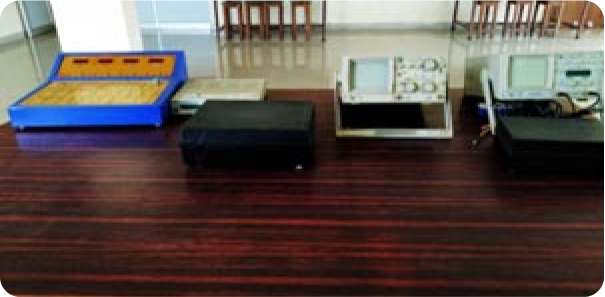
Material Testing Lab
Material Testing Lab in civil engineering plays a crucial role in ensuring that the construction projects are safe and durable. By testing the physical, mechanical, and chemical properties of various materials, the lab provides valuable data that can be used to make informed decisions about material selection and design.
Materials testing is a course which helps the students to comprehend and quantify whether a detailed material or treatment is appropriate for a particular application. As it has multiple variety of materials and treatments available in the marketplace, testing can help slender down the varieties to the most appropriate selection for the intended use. This lab is equipped with specialized equipment and trained personnel to carry out tests on a wide range of materials, including concrete, soil, steel, asphalt, mechanical properties, elemental composition, corrosion resistance and the effects of heat treatments.
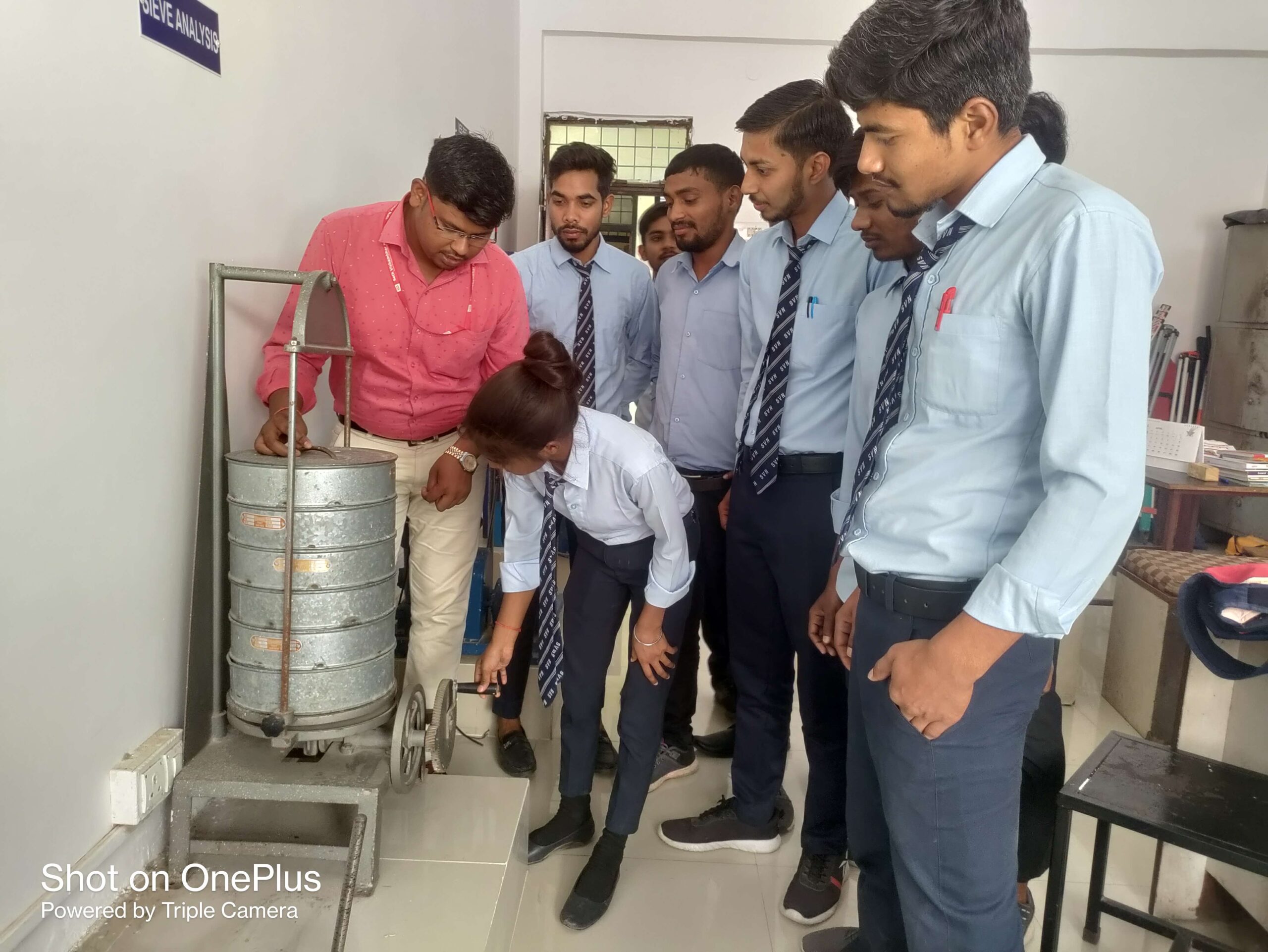

CAD Lab
The computer aided design lab is equipped with high performance platform and PC for students learning. There are various software related to Structural analysis, geotechnical engineering, water-resources engineering, geomatics engineering which are available for enhancing students’ knowledge.
CAD modeling software offers maximum control to architects over the visual representations of their designs. This allows them to upgrade their knowledge about different perspective with the simple drag of a mouse rather than having to create a whole new drawing by hand. CAD also helps professionals reuse designs as needed.
Hence CAD lab is an essential resource for civil engineering students, providing them with the tools, instruction, and opportunities they need to develop their skills and prepare for a career in civil engineering.

Geotechnical Engineering Lab
Geotechnical engineering is a field of civil engineering that deals with the activities and properties of land materials, such as soils, rocks, and groundwater. Geotechnical engineering laboratories are important for conducting various tests and experiments on these materials to evaluate their properties and behavior. By this lab students learn and enhance their knowledge regarding the purpose for Geotechnical engineering, its equipments, and typical tests.
The Geotechnical Engineering lab has facilities like standard soil and rock samples testing, gear including soil grouping, compaction, combination, direct shear, porousness, unconfined pressure and anxiety controlled monotonic triaxial devices.


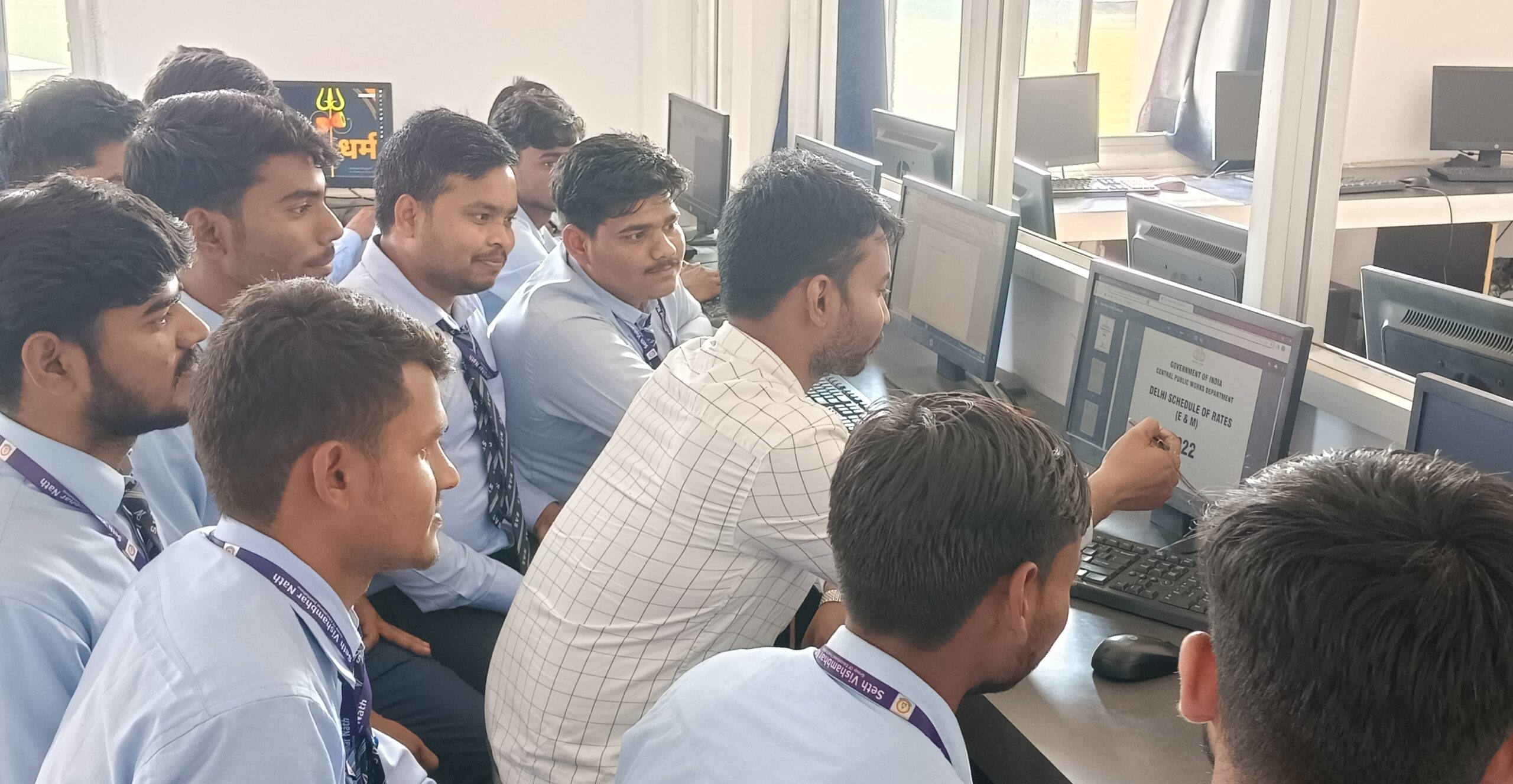
Quantity Estimation and Management Lab
The Quantity Estimation and Management Lab is a valuable resource for prospective civil engineering students and professionals looking to develop their skills in material estimation and management. By providing access to software, tools, and physical materials, the lab helps students gain practical experience and prepare for the challenges they will face in the field.
The Lab provides facility where prospective civil engineering students can learn and practice the skills necessary to estimate and manage quantities effectively. This lab involves determining the quantities of materials required for a construction project and ensuring that those materials are procured, delivered, and used efficiently.

Concrete Lab
Concrete lab enhances the knowledge of students regarding the most vital material used in the construction industry. It is a versatile and durable material that can be used to build a wide range of structures, including buildings, bridges, roads, and dams. The quality and strength of concrete depend on the materials used, the mix ratio, and the curing process.
Concrete lab in civil engineering is an essential facility that helps to test the quality of concrete and ensure that it meets the required standards. The behavior and properties of concrete and concrete making materials can be better understood by conducting first-hand experiments in the laboratory.

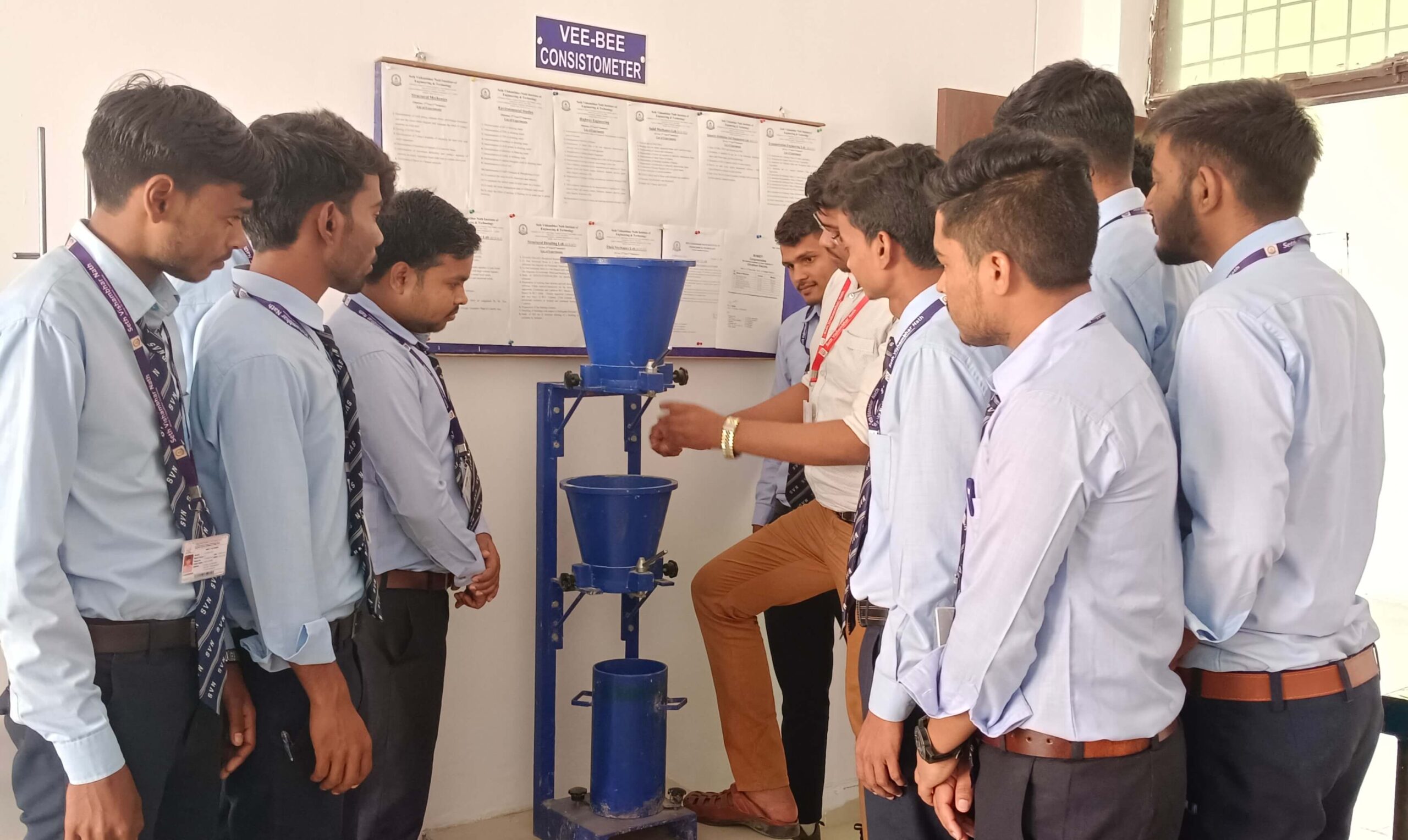
Polytechnic Program
Vision of the Department:
To provide effective education to the students having professional, ethical and societal in the field of Civil Engineering.
Mission of the Department:
M-1: To impart an effective environment of teaching, learning, and technical knowledge in Civil Engineering.
M-2: To improve the quality of education and prepare for employability.
M-3: To develop ethical, professional & moral values among students with societal and environmental concerns.
M-4: To encourage students to pursue higher education, soft skills, leadership, and entrepreneurship qualities.
Program Educational Objectives
(PEOs)
The Program Educational Objectives (PEO) is the program to prepare the Diploma holders for their career and professional living in Civil Engineering offered by Seth Vishambhar Nath Institute of Engineering and Technology, Barabanki, Uttar Pradesh, affiliated to Board of Technical Education, Uttar Pradesh INDIA are:
PEO-1: To develop the ability to solve the problems of Civil Engineering.
PEO-2: To impart the knowledge of a successful career in industry & higher studies by acquiring knowledge in Civil Engineering.
PEO-3: To develop the ability of morality, leadership, professionalism, independent thinking and self-confidence.
PEO-4: To be capable of applying technical knowledge and skills.
Attributes / Program Outcomes (POs)
(Diploma in Engineering, students will be able to)
PO-1: Basic and Discipline specific knowledge: Apply knowledge of basic mathematics, science and engineering fundamentals and engineering specialization to solve the engineering problems.
PO-2: Problem analysis: Identify and analyze well-defined engineering problems using codified standard methods.
PO-3: Design/ development of solutions: Design solutions for well-defined technical problems and assist with the design of systems components or processes to meet specified needs.
PO-4: Engineering Tools, Experimentation and Testing: Apply modern engineering tools and appropriate technique to conduct standard tests and measurements.
PO-5: Engineering practices for society, sustainability and environment: Apply appropriate
technology in context of society, sustainability, environment and ethical practices.
PO-6: Project Management: Use engineering management principles individually, as a team member or a leader to manage projects and effectively communicate about well-defined engineering activities.
PO-7: Life-long learning: Ability to analyze individual needs and engage in updating in the context of technological changes.
Departmental PSO’s
Program-Specific Outcomes
(PSOs)
After the successful completion of the Diploma program in “Computer Science & Engineering” the graduate will have
PSO-1: Ability to use the knowledge of civil engineering in various domains to carry out the survey, prepare a plan and estimation.
PSO-2: Ability to apply the fundamentals knowledge of Civil Engineering and encourage them for higher education.
PSO-3: Ability to operate software for modeling the plan and execution.
PSO-4: To develop moral values among the students to work in the field of Civil Engineering.
Syllabus

